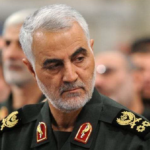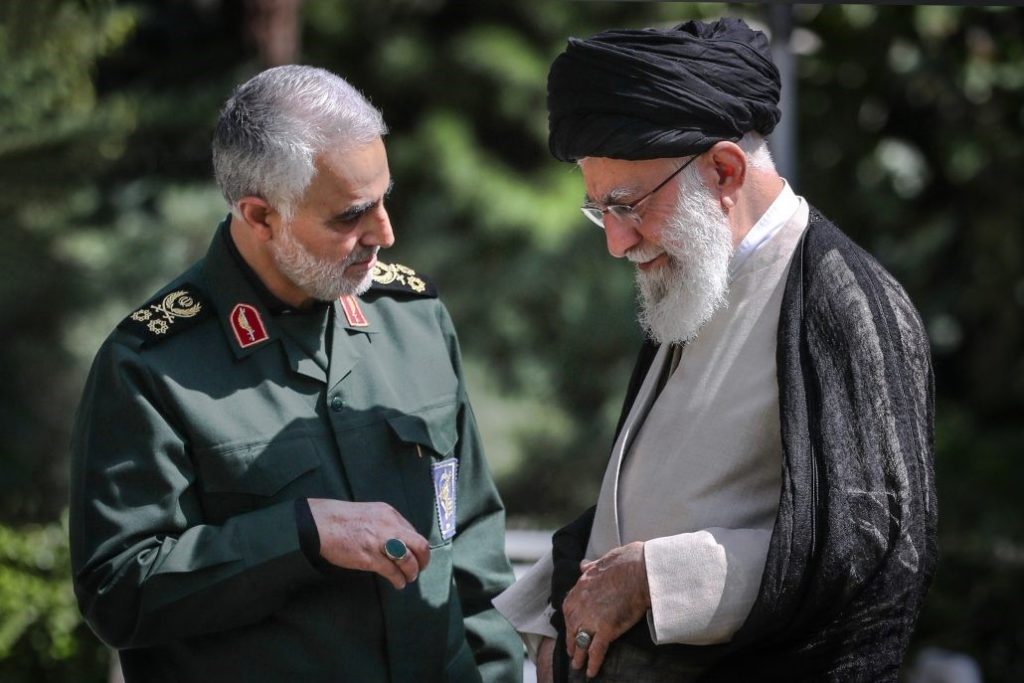Politically charged reports of the attack that killed Iranian Major General Qasem Soleimani and an Iraqi Militia commander have largely ignored its response to important historical facts, last week’s Iranian attack that killed an American and wounded four soldiers and intelligence reports of pending threatened additional Iranian attacks on Americans. And hopefully that President Trump’s consequential decision has changed the dynamics in the Middle East in a positive way.
To be sure, there are significant uncertainties about what the future holds. And there are consequentially negative outcomes that can result — including in the very near future, especially given Iran’s ability to do great harm to America and our interests here at home.
After all, Iran has demonstrated an ability to employ cyber attacks to cause major disruptions — for example in threatening our electric power grid. There could be terrorist groups within the United States. And, contrary to comfortable assumptions otherwise, Iran may already have a few nuclear weapons they could employ against us.
Click here, for a February 12, 2015 Newsmax article (“Experts: Iran Now a Nuclear-Ready State, Missiles Capable of Hitting US”) in which several well informed colleagues and I noted our view that even then our planners should have assumed Iran already had or shortly could have had nuclear weapons.
After all, Iran was closely following already nuclear-armed North Korea’s example — as a strategic partner allied by treaty and pledged to share scientific and military technology — and had sacrificed its overt civilian nuclear program to deceive the Obama administration that lifted its international sanctions and entered a terrible unverifiable nuclear deal — the so-called Joint Comprehensive Plan of Action (JCPOA), while its clandestine military nuclear program no doubt continued underground.
We noted that prior to 2013, Iran was manufacturing nuclear weapons components, performing non-fissile explosive experiments of an implosion nuclear device and working on the design of a nuclear warhead of its Shahab-III missile. Iran was then — seven years ago — a threshold nuclear-missile state.
It seemed (and still seems to me) unlikely that the unverifiable nuclear deal significantly slowed Iran’s development activities. It still seems unwise to assume that Iran does not have nuclear weapons — after all they could even have purchased them from their ally North Korea with the billions the Obama administration released in exchange for the terrible Nuclear Deal.
So, I seriously doubt President Trump’s claim that Iran will never have a nuclear weapon since the Mullahs may already have one or more. I’d prefer he simply promise to block their currently ongoing nuclear development programs — and remain diligent.
In any case, this condition reinforces my oft-stated view that we are living in the most dangerous time in my lifetime — that, by the way, includes World War II.
That was the condition before the events of last week — and is the context from which I view President Trump’s decision to kill General Soleimani, generally recognized as the number two leader of Iran, after Supreme Leader Ali Khamenei, and mastermind of Iran’s worldwide terrorist activities via its numerous surrogate partners, including Hezbollah.
Notably, Abu Mahdi al-Muhandis, who was killed along with Suleimani, commanded Kata’ib Hezbollah, the group that last week killed an American civilian and wounded four American soldiers. That event no doubt was part of the “tripwire” for President Trump’s decision. But, it was also because of Intelligence Community assessments of growing, perhaps near-term, threats being posed by Iran under Soleimani’s leadership.
After all, Soleimani had long been a notorious terrorist — some date his early involvement to 1979, when Iranian terrorists stormed the U.S. Embassy and took 52 Americans as hostages. This fact was implied by President Trump’s tweet that he was considering 52 Iranian targets should Iran strike back in retaliation for the recent U.S. attack that killed Soleimani and Abu Mahdi.
Soleimani joined the Islamic Revolutionary Guard Corps (IRGC) in 1979 and since 1998 has commanded the IRGC elite Quds Force. He has been seen by Western leaders as central to Iran’s ties to numerous terrorist groups and the key architect of Iran’s regional influence and extending Iran’s diplomatic weight in Iraq, Syria and beyond.
Click here for a still pertinent brief review of Iran’s history by former Speaker of the House Newt Gingrich in his October 16, 2017 Fox News article, “Death to America — Why Trump’s Iran Policy is Right.” He began his excellent article warning about the terrible Iran Deal, the JCPOA, and correctly describing Iran’s serious threat to America and Israel — and the delusion of past American leaders of both political persuasions in dealing with both Iran and North Korea.
He noted that President Trump understands this history and the failure of the “appeasement and negotiation” policy since 1992 that produced North Korea’s current nuclear-armed ballistic missile threat. And that President Trump will not fall prey to the arms control community’s siren song that has so often misled our national leaders.
Newt’s review of Iran’s activities since the 1979 “revolution” and our failed responses was instructive:
- 1979-1981 Iranian hostage crisis that ended with the election of President Reagan after President Carter’s failed efforts at negotiation and failed rescue efforts by special forces;
- 1983 truck bombs that killed 241 U.S. service personnel and 58 French paratroopers in Lebanon;
- 1987-88 U.S. naval support efforts to help Kuwaiti tankers pass through the Straits of Hormuz while Iran was attempting to mine the Persian Gulf;
- 1979-2008 U.S. unsuccessful efforts to contain Iranian and North Korean dictatorships, via an “axis of evil” strategy; and
- 2008-2016 Obama administration failures in its attempt to develop a new relationship with Iran, a “fictional fantasy” that allowed Iran to dominate the Middle East.
Newt noted Obama administration policies enabled much greater Russian influence in the Middle East, including in conjunction with its longstanding alliance with Iran and its other allies like Hezbollah, armed with more than 100,000 missiles that can be fired into Israel, while it built missile factories in Syria and Lebanon and developed plans for an Iranian Port in Lebanon. He noted Iran, then flush with money thanks to the JCPOA, was fermenting major instabilities, including propping up Hamas and funding a proxy war in Yemen against the Saudis.
Following these statements of a clear set of problems, the Speaker then explained that President Trump was properly interpreting the law passed by Congress. He pointed out that it was impossible for President Obama to certify that Iran was complying with the JCPAO. President Trump’s decision to withdraw from the JCPOA was supported by his key national security advisors — including the Secretaries of State and Defense. Click here for the letter I co-signed with 44 others also to that effect.
And the President’s sanction strategy has taken its toll on Iran. And that strategy can be extended to Iraq if Iraqi leadership were to direct American troops to leave, as some of their leaders have suggested while we all await Iran’s next step.
From my perspective, President Trump’s recent decisions are entirely consistent with his long stated policies — and I think he should stay the course, in spite of outspoken knee-jerk highly negative vocal responses from his political opponents, who have been uninformed about the facts that governed the President’s decision. Perhaps we shall understand more after tomorrow’s hearing to inform Congress of these important facts.
However, if the President is permitted to stay the course without such highly vocal negative U.S. public commentary, there is considerable hope that Iranian leaders will see the wisdom of finding a face-saving way to back away from an escalatory response. At least some informed experts have seen the possibility of this happening.
For example, click here for a pertinent discussion by former CIA Director and CENTCOM Commander General David Petraeus, who argued that “It is impossible to overstate the importance of the Soleimani Strike” and that the “real question” for the U.S. is whether there will be a sound diplomatic initiative.
Bipartisan support for such an outcome would be helpful — continued bipolar political discourse would not.
With that possibility in mind, click here for an informative Washington Post article by President George W. Bush’s National Security Advisor Steven Hadley, which provided reasoned arguments that the President has strengthened his hand in dealing with Iran — and that new situation may lead to diplomatic conditions for reducing the dangers.
Perhaps most notably, he observed that Abu Mahdi al-Muhandis, who was killed along with Soleimani, had been “behind the escalating violence over the past several months as part of a campaign (assuredly with Iranian approval) to force out [of Iraq] U.S. troops. That campaign culminated in the Dec. 31 attack on the U.S. Embassy in Baghdad.”
So, it would be ironic — and contrary to the interests of the Iraqi government and the U.S. — if the actions of some Iraqi leaders in response to the Soleimani attack now were to succeed in expelling American troops from Iraq, fulfilling the objective of Kata’ib Hezbollah led by Abu Mahdi al-Muhandis.
This result would constitute a win for Iran and a loss for those seeking freedom in Iraq. One might also expect cheering from Russian and Chinese leaders. Defense Secretary Esper has insisted that the U.S. troops are not leaving Iraq — and hopefully that position will stick.
It would support one component of the diplomacy advocated by Steve Hadley — for the U.S. to publicly commit to the sovereignty of Iraq and that the U.S. troops are to train Iraqi security forces to protect the Iraqi people from a resurgent Islamic State. The U.S. would, of course, coordinate with the Iraqi government on matters involving these troops.
Meanwhile, hand ringing by President Trump’s political opponents is to be expected — though it is most unbecoming for our uninformed elected representatives and senators to feed the political divisiveness associated with our political divide.
Former Democrat Senator and Vice President Candidate Joe Lieberman had it just right in his Wall Street Journal article, yesterday. Click here for that thoughtful article, appropriately titled “The Democrats and Iran — Why can’t the party’s candidates simply admit Qasem Soleimani’s death makes Americans safer?”
His opening paragraph gave a brief summary of his bottom line: “President Trump’s order to take out Qasem Soleimani was morally, constitutionally and strategically correct. It deserves more bipartisan support than the begrudging or negative reactions it has received thus far from my fellow Democrats.”
Senator Lieberman observed that during the Iraq War Soleimani oversaw three camps that trained and equipped Iraqi militias that killed more than 600 Americans since 2003 and others have noted that thousands more have been badly wounded. He also observed that the President’s authority to act quickly to eliminate a major threat is inherent in his authority under the Constitution; and that it is likely that Soleimani’s death will diminish the chances of wider conflict.
A most memorable quotation from his excellent article follows:
“After World War II, Sen. Arthur Vandenberg, a Michigan Republican who was chairman of the Foreign Relations Committee, formed a bipartisan partnership with President Truman that helped secure the postwar peace and greatly strengthened America’s position in the Cold War. ‘Politics stops at the water’s edge,’ said Vandenberg when asked why he worked so closely with a Democratic president. He added that his fellow Americans undoubtedly had ‘earnest, honest, even vehement’ differences of opinion on foreign policy, but if ‘we can keep partisan politics out of foreign affairs, it is entirely obvious that we shall speak with infinitely greater authority abroad.’”
To this sound perspective, I say “Amen.” And I wonder how we have become so misdirected in our politics.
Senator Lieberman says Democrats should leave partisan politics at “the water’s edge” and “stand together against Iran and dangerous leaders like Qasem Soleimani.”
I note with fond memories the sessions with our Senators and Representatives of both parties, when they visited us in Geneva during the Nuclear and Space Talks. In their private meetings with our delegation, they were open in their skepticism of President Reagan’s policies and welcomed our explanations.
But when they were with the Soviets and with the Press in the inevitable co-incident meetings, there was no daylight between us. And that helped us achieve the first treaties ever to reduce significantly the world’s nuclear arms.
Still, especially in view of the current disharmony, my current bottom line this week is that we are indeed in a dangerous world — more dangerous that anytime I can recall.
And I didn’t yet even mention the existential threat that could result for the electromagnetic pulse (EMP) that would result from nuclear weapons detonated over the United States. North Korea has this capability today — and its ally Iran may as well.
Bottom Lines.
It is indisputable that we are living in a very dangerous time, and that Iran has long had a central role in the conditions that influence ongoing events — especially in the Middle East. This situation is unlikely to change in the foreseeable future.
It is yet to be seen whether President Trump’s decision to kill Soleimani worsens or helps our strategic situation and security. Associated with this situation will also include our diplomatic initiatives with others in the Middle East — especially among the Sunni Arabs and in concert with Israel.
Our best hope for stopping Iran’s persistent terrorist efforts is to stay the course with sanctions, while holding the possibility of economic relief as a prize for the Mullah’s withdrawal from its previous ways — however unlikely that seems.
Whatever may come from current reactions to recent events, we should rapidly provide needed protection against the existential EMP threat to all Americans posed by both North Korea and Iran.
What can you do?
Join us in praying for our nation, and for a rebirth of the freedom sought, achieved and passed to us by those who came before us.
Help us to spread our message to the grass roots and to encourage all “powers that be” to provide for the common defense as they are sworn to do.
Begin by passing this message to your friends and suggest they visit our webpage www.highfrontier.org, for more information. Also, please encourage your sphere of influence to sign up for our weekly e-newsletter.
Encourage them to review our past email messages, posted on www.highfrontier.org, to learn about many details related to the existential manmade and natural EMP threats and how we can protect America against them. I hope you will help us with our urgently needed efforts, which I will be discussing in future messages.
Click here to make a tax deductible gift. If you prefer to mail a check, Please send it High Frontier, 20 F Street 7th Floor, Washington, DC 20001.
Please click here to read Past Weekly Updates!
Please help High Frontier continue this important and timely work!
Be sure to follow us on our Social Sites!
If you found this letter via our Social Sites, and you would like to subscribe, please click below!






